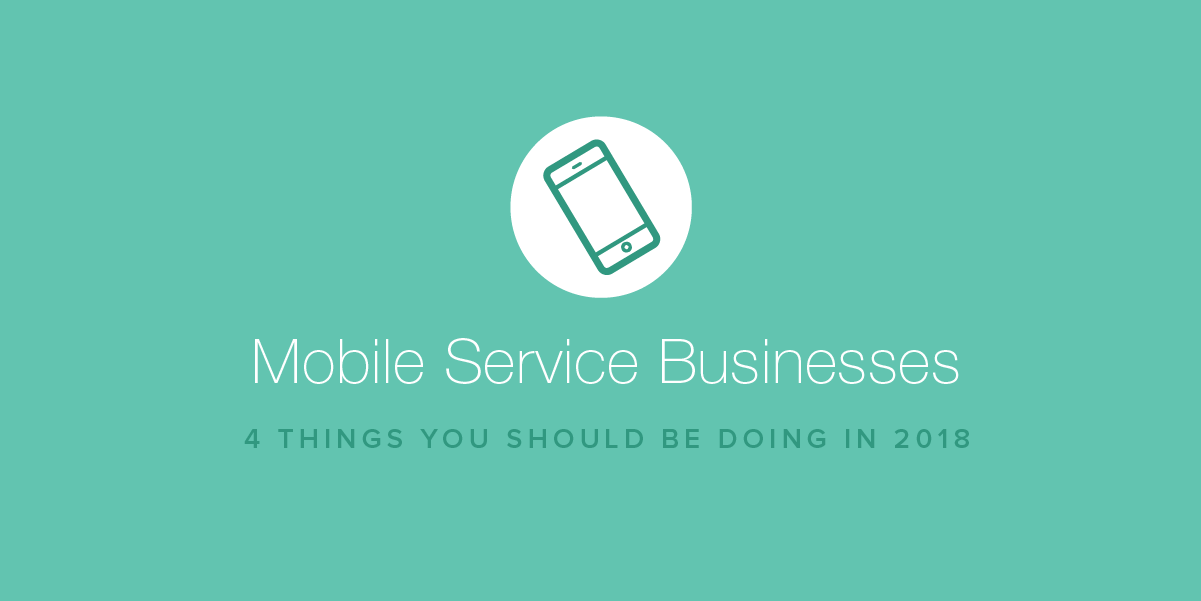4 Mobile Service Business Ideas You Should Be Trying in 2018
- March 11, 2018
- By: Vonigo
Here are four mobile service business ideas that may give you a competitive advantage.
Did you know that approximately 52 percent of mobile service companies still coordinate tasks and perform functions manually? As a service business owner or manager, pay close attention to this statistic. In layperson’s terms, around half of your competitors do not utilize the latest mobile service business software.
The mobile service space continues to grow rapidly. Many companies are leaping to test out new technologies to evolve their processes from manual, less-efficient operations. According to Salesforce, productivity software is the number one priority in small businesses’ tech budgets.
Innovations such as the Internet of Things (IoT), automation, mobile capabilities, and project management software that increases productivity are boosting profits, enhancing customer satisfaction and improving overall brand loyalty.
It is crucial to realize that your competitors may be making software upgrades and making an enhanced mobile experience a priority.
If you don’t want to lag behind, check out these service business ideas you should pay close attention to in 2018:
1. The Internet of Things (IoT)
Are you familiar with the term IoT? By definition, it is defined as “the communication between a network of internet-enabled devices, systems and physical objects that feature an IP address for internet connectivity.”
Essentially, the IoT consists of any device that can connect to the internet, and features many items technicians service, from engines and machines to HVAC systems. IoT assets can also include vehicles or buildings and contain software and sensors that allow them to send data over wireless networks.
Research company Gartner recently noted in a study that today’s service companies should strongly consider adapting their processes to the IoT as it will continue to deliver fundamental changes to mobile service. The study suggests that companies should adapt everything from employee training and service-licensing agreements.
Gartner experts point out that mobile service business managers should consider changing up the reactive-style contract in situations where IoT assets are important. For example, as an alternative, they should draft contracts that take advantage of IoT sensors’ abilities to predict maintenance, instead of scheduling it after an asset has already broken. This can save teams time and money through preventative maintenance.
Another example can be seen in service history tracking, where newer team members have a definitive place to enter critical information about assets. This technology can track how many times someone has repaired a piece of machinery, and what type of service was performed – all extremely valuable information.
2. Succession Planning for an Aging Workforce
Current research shows that 70 percent of service organizations view the loss of knowledge and talent as a massive challenge in coming years.
Baby Boomers are gradually phasing out of the workforce. Some of the negative effects can be seen in an uptick in customer dissatisfaction. This can be due in part to inexperienced workers, and enormous costs to train new, knowledgeable employees.
Many mobile service management technologies now include helpful features including service history tracking and work order management. Each of these tools can help organizations retain their aging employees’ knowledge-base, well after they have retired. This type of software can help recruit and train new team members.
3. Going Mobile
Researchers believe that the number of mobile phone users globally will exceed $5B by 2019.
It may seem gratuitous to talk about “mobility” in a field where the professionals are always on-the-go, but the actual nature of the industry’s mobility has been evolving as of late. Previously, a technician’s mobility was merely about going somewhere where something needs fixing.
With innovative service management software, technician mobility is quickly becoming part of a greater, more integrated experience. Team members have the ability to access information and communicate in a way previously limited to a company’s main headquarters. A mobile app with messaging can make it easier for a technician to ask questions of team members elsewhere.
4. Using Automation to Expand Your Mobile Service Business
You can’t grow your mobile service business if you spend all of your resources on time-consuming tasks. However, by implementing newer, automated processes company-wide, you can save tons of time and money.
You can use technology to create client intake forms that automatically create work orders. Or, you can schedule appointments, craft invoices, or generate emails. It can be a game-changer.
Automation also enables immediate access to current inventory and customer data. This, in turn, allows employees to function more efficiently. It saves valuable time in hunting down information and allows employees to spend more time giving customers what they want.
Final Thoughts
Mobile services are competitive industries. Taking steps to incorporate smart technology and connected products can make a significant difference to today’s expanding field service businesses.
Get it right in 2018 with the help of these four tactics. Your mobile service business has the potential for considerable growth in 2018. When you have good momentum, the latest technologies can help you along the way.
About the Author
Lisa C. Dunn is a writer for TechnologyAdvice.com. She is a freelance writer, copywriter, and ghostwriter who develops high-quality content for businesses and non-profit organizations. For over 20 years, she has worked with numerous PR and digital marketing agencies, and her work has been featured in well-known publications including Forbes, VentureBeat, Mashable, Huffington Post, Wired, B2C, USA Today, among others.
Want to learn about field service software can help your business grow and be more profitable? Book a free, private demo of Vonigo.




